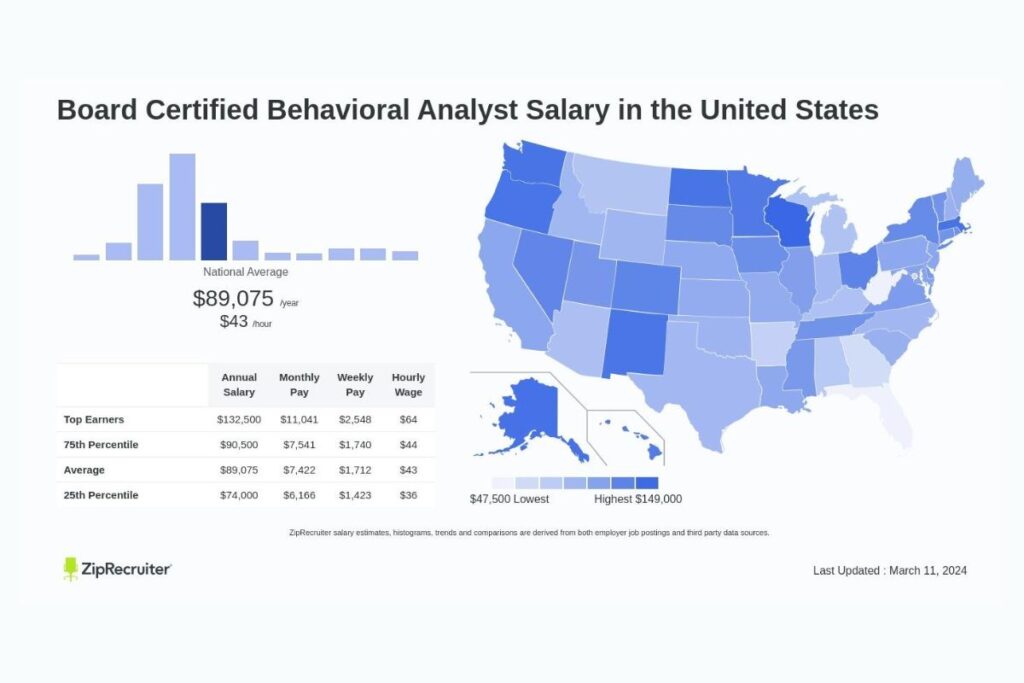A Board Certified Behavior Analyst (BCBA) is a professional who has received certification in applied behavior analysis (ABA). BCBAs are recognized for their expertise in understanding and modifying human behavior, particularly in contexts requiring precise behavioral interventions. They play a pivotal role in assessing behavioral needs, developing and implementing intervention plans, and evaluating their effectiveness.
BCBAs work across various settings, including schools, healthcare facilities, and private practices, applying their skills to help individuals improve social interactions, learn new skills, and manage challenging behaviors. Their work is especially impactful in supporting individuals with developmental disorders, such as autism spectrum disorder, ensuring they achieve greater independence and quality of life.
Education Requirements for BCBAs
Becoming a BCBA requires a structured educational and training pathway, emphasizing both theoretical knowledge and practical application. Here are the key steps:
- Academic Qualifications: Candidates need to earn at least a master’s degree in psychology, education, or a related field, ideally with a focus on behavior analysis.
- Coursework in Behavior Analysis: Specific coursework, accredited by the Behavior Analyst Certification Board (BACB), is required to ensure foundational knowledge in behavior principles and interventions.
- Supervised Fieldwork: Candidates must complete a defined period of supervised fieldwork, providing direct experience in applying ABA principles under the guidance of a certified professional.
- Certification Exam: After fulfilling the educational and fieldwork requirements, candidates must pass the BCBA certification exam to demonstrate their competency in the field.
Career Paths for BCBAs
With certification, BCBAs have a wide array of career opportunities across different sectors, leveraging their specialized skills to make significant impacts. Some of the career paths include:
- Clinical Practice: Providing behavior analysis services in clinical settings, working with individuals or groups to address specific behavioral issues.
- Education: Working within educational systems to support students with behavioral challenges, developing and implementing behavior intervention plans.
- Consultancy: Serving as a consultant for organizations or private clients, offering expertise on behavior management strategies.
- Research: Engaging in research to explore new methods of behavior analysis or to investigate the efficacy of current practices.
- Corporate Sector: Applying behavior analysis to improve organizational efficiency, employee training, and management practices.
Factors Affecting BCBA Salaries
Variations in BCBA salaries are influenced by a few key factors: the level of education and certification, years of experience, and the location of the job.
Education & Certification
The salary of a BCBA is significantly influenced by their educational background and certification status. Professionals with advanced degrees in Applied Behavior Analysis, like master’s or doctoral degrees, typically earn more than those with only an undergraduate degree. This is because higher education levels offer a more in-depth understanding of ABA, enhancing a professional’s value in the field.
Earning a Board Certified Behavior Analyst (BCBA) certification is key for career growth and improved salary potential. It validates a professional’s skill in applying ABA methods and their dedication to ethical standards, often leading to better pay due to their specialized expertise.
Years of Experience
Experience significantly impacts BCBA salaries; professionals with more years in the ABA field typically earn higher due to their advanced understanding and skills in behavior analysis. Such seasoned professionals are often sought after for their ability to tackle complex cases and may progress to supervisory roles with better pay. In contrast, those starting their BCBA careers usually earn less, reflecting their initial entry-level status.
Geographic Location
The geographical location (region, state, or city) of a BCBA significantly impacts their salary. Factors such as the cost of living and the local demand for BCBA services influence salary variations. Typically, areas with higher living costs, notably large urban centers, provide higher salaries to account for these increased financial demands.

Average Salary for BCBAs in the U.S.
The average salary for a Board Certified Behavioral Analyst (BCBA) in the United States as of April 3, 2024, stands at $89,075 annually. This figure translates to about $42.82 per hour, equating to roughly $1,712 weekly or $7,422 monthly. Salary data shows a wide range across the profession, with the lowest earnings around $47,500 and the highest up to $149,000 annually. The typical salary range varies significantly, from $74,000 at the 25th percentile to $90,500 at the 75th percentile, reaching up to $132,500 for the top 10% of earners. This variation indicates potential for salary growth through skill development, geographical relocation, and accumulating experience in the field.
Average Salary for BCBAs by State
Location significantly impacts BCBA salaries, with average earnings varying by state. Here’s a look at the 12 states that offer salaries above the national average:
- New Jersey: $98,707
- Wisconsin: $96,396
- Alaska: $94,011
- Massachusetts: $93,884
- Oregon: $93,581
- Washington: $93,576
- North Dakota: $93,327
- New Mexico: $92,698
- Minnesota: $91,547
- Hawaii: $91,472
- Ohio: $89,441
- Colorado: $89,391
Leading this group is New Jersey, which offers an average salary that is 10.8% higher than the national average of $89,075, followed closely by Wisconsin and Alaska. Specifically, Alaska’s average BCBA salary surpasses the national average by 5.5%, with New Jersey adding an additional $9,632 to that average. This suggests that BCBA professionals in these states have substantial opportunities for economic growth, indicating that relocation could be a strategic move for those looking to enhance their earnings in this field.
Top 10 Highest Paying Cities
Here is a look at the top 10 cities where the typical salary for a BCBA role is above the national average:
- Menlo Park, CA: $113,053
- Redwood City, CA: $111,825
- Sunnyvale, CA: $111,425
- Livermore, CA: $111,367
- Arlington, VA: $110,935
- Covington, WA: $109,460
- Kent, WA: $108,009
- Vacaville, CA: $107,548
- Manhattan, NY: $106,410
- Mojave, CA: $106,160
Menlo Park, CA, is in the lead, with Redwood City, CA, and Sunnyvale, CA, following closely in second and third places, respectively. In Sunnyvale, CA, salaries exceed the national average by $22,350, a 25.1% increase, while Menlo Park, CA offers an additional $23,978 above the average, marking a 26.9% increment from the standard $89,075.
Benefits & Perks
In addition to the base salary, BCBA professionals often enjoy a suite of benefits and perks that enhance the overall value of their compensation package. These additional benefits not only contribute to their financial well-being but also support their professional growth and personal work-life balance. Key benefits and perks typically include:
- Health Insurance Coverage: Employers usually provide extensive health benefits, including medical, dental, and vision insurance, ensuring comprehensive healthcare support for BCBAs.
- Retirement Plans: Many organizations offer retirement savings options such as 401(k) plans or pensions, aiding BCBAs in their long-term financial planning.
- Paid Time Off: BCBAs benefit from paid leave, including vacation days, sick leave, and public holidays, allowing them essential downtime for rest and rejuvenation.
- Professional Development Support: There is often support for ongoing education and professional development, including funding or reimbursements for attending conferences, workshops, or pursuing further education in the field.
Key Takeaways
The growing need for BCBAs means the profession provides not only excellent earning potential but also the ability to profoundly impact people’s lives. BCBAs can expect competitive salaries along with various benefits and advancement opportunities, underscoring the attractiveness of the field. Understanding these facets of the BCBA role is beneficial whether you’re new to the field or already established, helping you to maximize your career potential.






